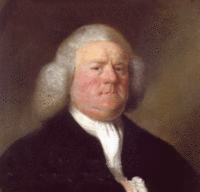Annotation:By Jove I’ll be free: Difference between revisions
m Text replacement - "garamond, serif" to "sans-serif" |
No edit summary |
||
| Line 1: | Line 1: | ||
---------- | |||
---- | {{TuneAnnotation | ||
|f_tune_annotation_title= https://tunearch.org/wiki/Annotation:By_Jove_I'll_be_free > | |||
'''BY JOVE I'LL BE FREE.''' AKA - "Come all you young lovers." English, Air (3/8 time). D Major. Standard tuning (fiddle). AABB. The song appears '''The London Magazine, and Monthly Chronologer''' (London, 1741), and in John Simpson's '''The Delightful Pocket Companion, vol 2''' (London, 1745), attributed to Mr. Boyce. It was subsequently republished in numerous songsters for the next century, including John Fielding's '''The Convivial Songster''' (London, 1782), '''The Humming Bird''' (London, 1785), and the American Sway & Ely's '''The Songster's Assistant''' (Suffield, Conn., 1800). It frequently appears in the section of songs "For Gentlemen," perhaps because its protagonist gives advice to avoid commitments and refuse consequences to the opposite sex: | |f_annotation='''BY JOVE I'LL BE FREE.''' AKA - "Come all you young lovers." English, Air (3/8 time). D Major. Standard tuning (fiddle). AABB. The song appears '''The London Magazine, and Monthly Chronologer''' (London, 1741), and in John Simpson's '''The Delightful Pocket Companion, vol 2''' (London, 1745), attributed to Mr. Boyce. It was subsequently republished in numerous songsters for the next century, including John Fielding's '''The Convivial Songster''' (London, 1782), '''The Humming Bird''' (London, 1785), and the American Sway & Ely's '''The Songster's Assistant''' (Suffield, Conn., 1800). It frequently appears in the section of songs "For Gentlemen," perhaps because its protagonist gives advice to avoid commitments and refuse consequences to the opposite sex: | ||
[[File:boyce2.gif|200px|thumb|right|William Boyce]] | [[File:boyce2.gif|200px|thumb|right|William Boyce]] | ||
<blockquote | <blockquote> | ||
''Come all you young lovers who wan with despair,''<br> | ''Come all you young lovers who wan with despair,''<br> | ||
''Composed idle sonnets, and long for the fair;''<br> | ''Composed idle sonnets, and long for the fair;''<br> | ||
| Line 12: | Line 11: | ||
''Be wise, by example, take pattern from me,''<br> | ''Be wise, by example, take pattern from me,''<br> | ||
''For let what will happen, by Jove, I'll be free.''<br> | ''For let what will happen, by Jove, I'll be free.''<br> | ||
</blockquote> | |||
"Mr. Boyce" may refer to composer William Boyce (1711-1779), who wrote symphonies, anthems and odes, and occasionally lesser music, such as the famous song "[[Heart of Oak]]." | "Mr. Boyce" may refer to composer William Boyce (1711-1779), who wrote symphonies, anthems and odes, and occasionally lesser music, such as the famous song "[[Heart of Oak]]." | ||
|f_source_for_notated_version= | |||
|f_printed_sources= Aird ('''Selection of Scotch, English, Irish and Foreign Airs, vol. 3'''), 1788; No. 498, p. 191. | |||
|f_recorded_sources= | |||
|f_see_also_listing= | |||
}} | |||
Latest revision as of 16:29, 18 May 2024
X:1 T:By Jove I’ll be free M:3/8 L:1/8 R:Air Q:"Moderato" B:James Aird – Selection of Scotch, English, Irish and Foreign Airs, vol. 3 (Glasgow, 1788, No. 498, p. 191) N:”Humbly dedicated to the Volunteers and Defensive Bands of Great Britain and Ireland” Z:AK/Fiddler’s Companion K:D D|FAA|AdA|F/G/AA|A2A|Bcd|eAG|F/A/G/F/E/D/|E2D| FAA|Add|F/G/AA|A2e|f(e/d/c/B/)|c/d/eA|dc/B/A/^G/|A2:| |:A|def|Bcd|ed/c/B/^A|B2d|FAA|AdA|Bg/f/e/d/| c2d|eAG|F2A|Bcd|eAf|gf/e/d/c/|d2:||
BY JOVE I'LL BE FREE. AKA - "Come all you young lovers." English, Air (3/8 time). D Major. Standard tuning (fiddle). AABB. The song appears The London Magazine, and Monthly Chronologer (London, 1741), and in John Simpson's The Delightful Pocket Companion, vol 2 (London, 1745), attributed to Mr. Boyce. It was subsequently republished in numerous songsters for the next century, including John Fielding's The Convivial Songster (London, 1782), The Humming Bird (London, 1785), and the American Sway & Ely's The Songster's Assistant (Suffield, Conn., 1800). It frequently appears in the section of songs "For Gentlemen," perhaps because its protagonist gives advice to avoid commitments and refuse consequences to the opposite sex:

Come all you young lovers who wan with despair,
Composed idle sonnets, and long for the fair;
Who puff up their pride by enhancing their charms,
And tell them 'tis heaven to lie in their arms;
Be wise, by example, take pattern from me,
For let what will happen, by Jove, I'll be free.
"Mr. Boyce" may refer to composer William Boyce (1711-1779), who wrote symphonies, anthems and odes, and occasionally lesser music, such as the famous song "Heart of Oak."

